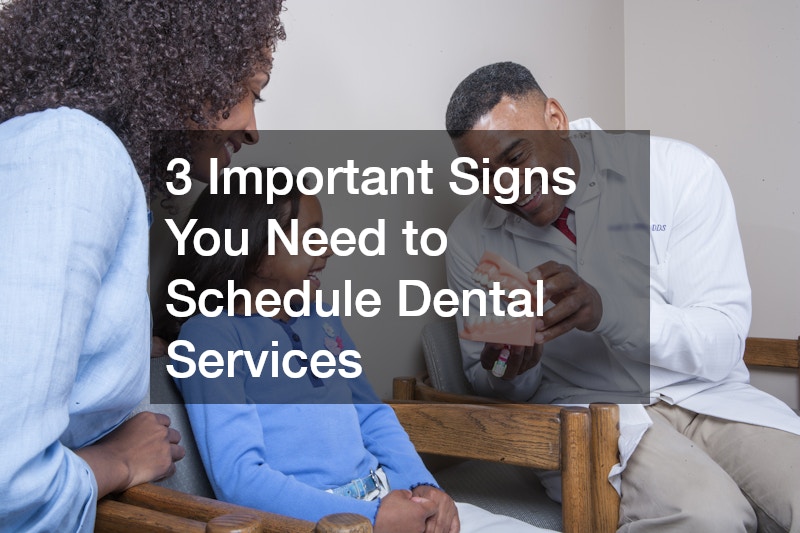
Understanding when to seek professional dental care is crucial for maintaining oral health. Regular dental check-ups can prevent minor issues from escalating into serious problems. In this article, we'll explore three key signs indicating that it's time to schedule a visit to your dentist.
Persistent tooth pain can arise from a variety of sources, each potentially impacting different aspects of oral health. Cavities are a common culprit, as they erode enamel and expose sensitive inner tissues.
Video Source
Additionally, gum disease and dental abscesses are significant contributors, often leading to inflammation and increased sensitivity.
Beyond these conditions, tooth pain may also result from bruxism, or teeth grinding, which often occurs during sleep and stresses the teeth. Similarly, cracked or damaged teeth can lead to pain, especially when chewing or when exposed to extreme temperatures. A fact worth noting is that some individuals may experience referred pain, where discomfort in one area of the mouth is felt elsewhere.
Neglecting persistent tooth pain can exacerbate these issues, potentially leading to more complex dental procedures and health risks. Scheduling timely dental services can prevent minor irritations from developing into more serious conditions. Overall, understanding the underlying causes aids in choosing the appropriate intervention.
Home remedies for tooth pain can provide temporary relief, but they are not a substitute for professional dental care. Remedies like saltwater rinses or cold compresses may alleviate pain momentarily, but do not address the underlying causes. It's critical to seek a dentist's evaluation if the pain persists to avoid potential complications.
While over-the-counter pain relievers and remedies offer short-term comfort, they risk masking symptoms without treating the root problem. A dental professional can examine the situation more thoroughly, utilizing diagnostic tools like X-rays for a comprehensive understanding. Prompt professional intervention ensures that conditions like cavities or infections are treated effectively.
Bleeding gums commonly result from gingivitis, the initial stage of gum disease characterized by inflammation and irritation. Inadequate oral hygiene allows plaque, a sticky film of bacteria, to build up and irritate the gums. Over time, this can lead to more advanced periodontal disease if left untreated.
Other factors, such as aggressive brushing, using a toothbrush with hard bristles, or flossing incorrectly, can contribute to gum irritation and bleeding. Hormonal changes during pregnancy or certain medications can also make gums more sensitive. Understanding these common causes aids in adopting preventive measures to protect gum health.
Ignoring initial signs of gum bleeding might lead to more severe complications, including gum recession and tooth loss. Early recognition and treatment of the underlying issue through improved oral hygiene or professional intervention can prevent these outcomes. Regular dental check-ups are crucial for monitoring gum health and addressing any emerging problems promptly.
When faced with bleeding gums, taking immediate action can prevent further damage and complications. Start by improving oral hygiene practices, such as brushing twice daily with a soft-bristled toothbrush and flossing gently between teeth. Incorporating an antibacterial mouthwash can also help reduce bacteria and inflammation.
Making dietary changes, like reducing sugar intake and increasing consumption of Vitamin C-rich foods, can support gum health. Drinking plenty of water and chewing sugar-free gum can aid in saliva production, which naturally cleanses the mouth. These steps not only address current bleeding but also serve as preventive measures for future gum issues.
Persistent bad breath, medically known as halitosis, can arise from various sources. Poor dental hygiene is a common factor, allowing food particles to remain in the mouth and create odors. Additionally, dry mouth conditions can contribute to bad breath due to reduced saliva production, which otherwise helps clean the mouth.
Dietary choices, such as the consumption of foods with strong odors like garlic and onions, can also affect breath temporarily. However, certain underlying medical conditions, such as gastrointestinal issues or sinus infections, may lead to chronic bad breath. Recognizing these causes is essential for determining effective strategies to manage and eliminate bad breath.
Other contributing factors might include smoking or the use of tobacco products, which can dry out the mouth and cause lingering odors. Understanding these diverse causes highlights the importance of a holistic approach to managing oral health. Addressing persistent bad breath often involves a combination of improved hygiene practices and medical evaluation.
Improving oral hygiene is the cornerstone of managing persistent bad breath. Brushing your teeth at least twice a day and cleaning your tongue can help remove bacteria and food particles. Flossing daily to reach areas that your toothbrush can't is equally important in maintaining fresh breath.
Hydration plays a crucial role in maintaining saliva production, which naturally cleanses the mouth. Additionally, chewing sugar-free gum can stimulate saliva flow, further aiding in reducing bad breath. Modifying your diet by reducing intake of odor-producing foods and incorporating more fruits and vegetables can also contribute to fresher breath.
Regular dental visits are essential for maintaining oral health and addressing issues before they become serious. By recognizing signs such as persistent tooth pain, bleeding gums, and chronic bad breath, you can ensure timely intervention and protect your overall health.
.